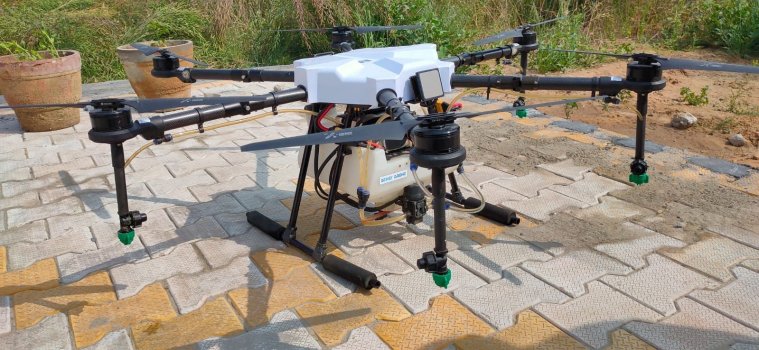On a sultry April afternoon, a pick-up truck carrying a metal-edged blue box, like the ones used to ferry audio equipment, stops by Adesh Jain's farm. As curious passersby and children crowd around, a drone with a tank attached is taken out. Within minutes, the machine is buzzing over Jain’s 114-acre field, showering the moong crop with a mix of yield-boosters, an insecticide and water.
This is the second time Jain, who also cultivates wheat and paddy, has hired Skylane Dronetech Pvt. to spray his farmland in Rohda Deori village of Udaipura, Madhya Pradesh, some 800 kilometers south of New Delhi. He was impressed the first time.
The drone used 30% less chemical than the manual boom sprayer and covered an acre in 8-10 minutes compared with the manual average of an hour. But there is one caveat. The cost, he said, is too high.
"Rs 500 per acre is a big amount. Without drones, I spend only about Rs 200-250 per acre,” he told BloombergQuint. “If the cost is brought down to those levels, I can seriously consider getting all my crops sprayed by drones."
Jain's experience shows early interest among Indian farmers to adopt drones. Yet, concern over costs is turning out to be a hurdle. More so because, unlike Jain, 86.2% of the nation's crop growers own less than five acres each, according to the 2015-16 agriculture census. For them, service charges are still prohibitive.
Continue reading: https://www.bloombergquint.com/business/coming-soon-an-uber-for-farm-drones
This is the second time Jain, who also cultivates wheat and paddy, has hired Skylane Dronetech Pvt. to spray his farmland in Rohda Deori village of Udaipura, Madhya Pradesh, some 800 kilometers south of New Delhi. He was impressed the first time.
The drone used 30% less chemical than the manual boom sprayer and covered an acre in 8-10 minutes compared with the manual average of an hour. But there is one caveat. The cost, he said, is too high.
"Rs 500 per acre is a big amount. Without drones, I spend only about Rs 200-250 per acre,” he told BloombergQuint. “If the cost is brought down to those levels, I can seriously consider getting all my crops sprayed by drones."
Jain's experience shows early interest among Indian farmers to adopt drones. Yet, concern over costs is turning out to be a hurdle. More so because, unlike Jain, 86.2% of the nation's crop growers own less than five acres each, according to the 2015-16 agriculture census. For them, service charges are still prohibitive.
Continue reading: https://www.bloombergquint.com/business/coming-soon-an-uber-for-farm-drones

